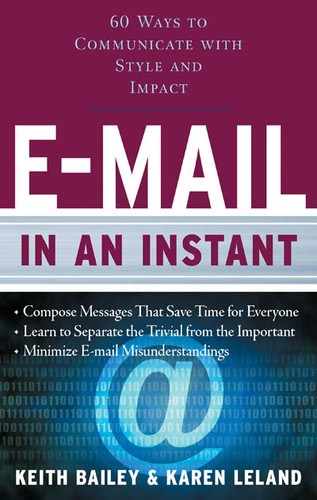24
Choose Your Sentence Style With Care
Depending on their tone, sentences can enlighten, entertain, educate, and, on occasion, even annoy. The right combination of sentence styles can be the difference between an e-mail that sings and one that falls flat. For shorter e-mails, one or two sentence types will usually fit the bill, but for longer, more complicated e-mails, a mixture works magic. The following are five basic sentence styles and some suggestions on how to use them to their best advantage.
Declarative sentences. These are sentences that simply state a fact or argument without asking the reader to take any action or choose sides either way. More often than not, they end with the plain old period. For example:
• I needed to work this weekend to get the report done.
• I will be in my cubicle by 1 p.m. Monday.
• I like peaches.
Exclamatory sentences. A more forceful version of a declarative statement, these express strong opinions and surprise at facts. They feel as if they should (and often do) end with an exclamation point. For example:
• I had to work all weekend—morning, noon, and night—to get that report done!
• I’ve earned the right to take Monday morning off!
• Peaches are the best fruit in the whole wide world!
Imperative sentences. Usually beginning with a verb, these sentences give a direct command to someone or ask for action. For example:
• Read this report for tomorrow.
• Take messages for me until I return.
• Consider your options.
Interrogative sentences. These sentences ask questions and usually begin with can, who, why, will, when, or how, and they always end with a question mark. For example:
• Will you please get me a double-decaf-mocha-latte-no-foam from the cafeteria?
• How many times have I gone over this with Bill?
• Does X mark the spot?
Rhetorical sentences. These are statements posed as questions, but not really meant for the reader to answer. When used sparingly, these types of sentences can add some flavor to an e-mail. For example:
• Why do we always seem to find ourselves in this situation?
• Is he serious?
• What is up with that?
Stream-of-consciousness sentences. A by-product of the online age, these sentences don’t really follow the rules of good grammar and are characterized by their free and loose style. For example:
• Wow, what a day … I had to deal with the dog … but that’s another story. Anyway, I got through it and now I’m working on my upcoming vacation. … France, I can’t wait … by the way, how’s your vacation plans coming?
Clearly, this type of sentence structure should only be used for casual, informal e-mails with people you know very well.
Exercise
Using the following information, write an e-mail that incorporates at least three of the sentence styles we outlined.
1. This e-mail is from you to a coworker about your upcoming vacation.
2. You need to have your top accounts covered while you are away.
3. Your coworker is overwhelmed and already has too much to do.
4. You will be gone on vacation for one week only.
______________________________________________________________________
______________________________________________________________________
______________________________________________________________________
______________________________________________________________________
______________________________________________________________________
______________________________________________________________________
